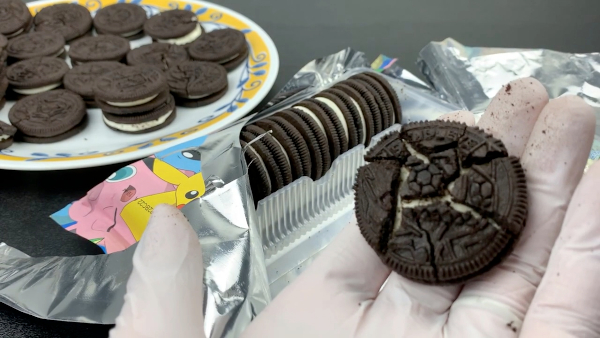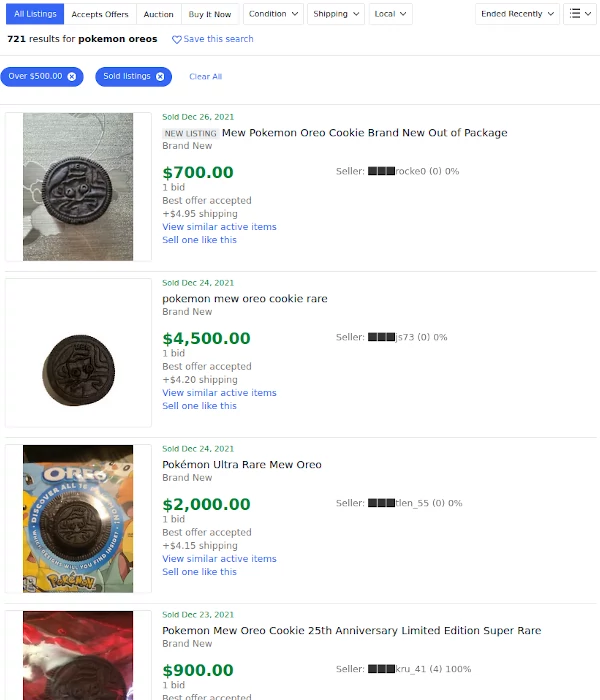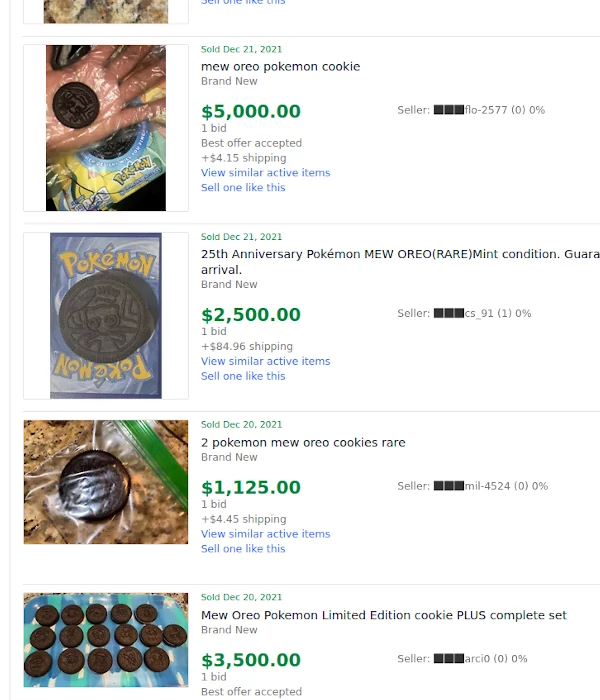Most of the world found money to spend on indoor and couch-based activities during the on-again, off-again lockdowns. One of those steaming up a continuous crease was the enduring lure of sending animals to fight one another in the Pokémon franchise. Rolling on the high of the Sword & Shield games, into the trading card lava re-boil, it was next onto a collaboration with Oreo cookies. A collaboration stoking fervour selling out shelves for the sweet-toothed. In reality, a fever dream made of smoke and mirrors as a front for money laundering with regular people mixed in for hapless colour.
News and media outlets filling the unnerving silence between murder and corruption latched on to reports of Pokémon Oreo cookies selling for high dollar amounts on eBay. As in hundreds of dollars. For a food item that expires in a few months unopened, far quicker to rot if the seal is breached. Speculation and ludicrous price tags shooting up a frothy excitation. The kind of buzz where toilet paper falls off the racks and sloshes against the bidet.
The concept is simple. Each limited edition packet of Pokémon Oreos features a random selection of 16 characters. Pikachu, Piplup, owl-looking-thing, bedazzled gremlin, Jigglypuff seen from the front, etc. One of them, Mew, is supposedly rare. Supposedly, but this is a fabricated scarcity with a package hint that it may be difficult to score (it isn’t) and that the inhaler of said accidentally-vegan treats should collect all that they are able to of the roster.

If enough people at the start pretend something is rare, it won’t be long before outsiders drag their knuckles all over their rubber-domed keyboards and greasy smartphones to get in on the action. They’ll see the numbers, whistle through their chapped lips, and think about what kind of madness they are missing out on, rushing off to the supermarket themselves to see if they can flog one of their own lest they miss out on a piece of this mud cake. In short order their dreams will crumble, left holding another snack they swear the kids asked for.
Yet, months after the launch and retail sellout, eBay listings still show Pokémon Oreos ratcheting up there in after-market prices. None of it makes sense. At least not to the degree it continues on. Not unless it’s also part of a child trafficking network. It’s already halfway to the suggested best before date.
There is a difference between active listings and solds. You can ask for whatever dollar amount on a listing. It doesn’t matter until, or unless, it actually finds a buyer. Squatting on the merchandise for a payout is a delicate balance of posting it at the right market-bearing value, or some hapless stoner (or child using their parent’s account) thinking it was a card to add to their deck.
By default eBay listings don’t seem to show the seller’s rating. If you customise the results listing (look for the hamburger icon top right of options) you can choose to display “Seller information”. Once set, running an in-page search for “(0) 0%” shows what kind of seller accounts are flooding the market.
For the day or so after Boxing Day, for sales that completed as “sold” over USD 500, we can see an average of 161 out of 200 recent sales are from zero-accounts. Accounts with no feedback, no previous sales. Fresh off the block and ready to shill. That’s about 80% looking rather sus.
Clearly this is all a way to launder money.
The Oreo shelf life is short. Unless the buyer is stashing them away in air-voided environments, or dropping them in epoxy, there is no reasonable cause to fork over more than one dollar for a “rare” biscuit that can be had in the next sleeve, or the next packet.
The photos are reasonable enough. Oh look, this listing uses gloves. This other listing has the biscuit in a dime bag. Another has it in a vacuum seal. All lies. All a ruse. Nothing more than showing up to look the part of something legitimate.

Nobody in their sane mind would spend this amount of money on deteriorating junk food as a collector’s item. Trading cards are a different matter. They are shelf stable, consistent, and at least have utility played in a game of deck strategy.
There’s something rotten going on in the state of selling Pokémon Oreo cookies. What are we looking at here? After eBay takes their cut, say about 10-13% in fees, and the printed shipping label for a light-weight item averages under six dollars, that is still a lot of stuffing left over to wash and clean dirty money. Throw in a few gullible bystanders thinking there is any resale value, and it muddies the water enough to seem like Pokémon Oreo cookies are rare enough bait.

Nobody is reasonably forking over hundreds of dollars to buy these biscuits because nobody is actually selling them at this price point. Not without digesting dirty money into a cleaner vestibule. Of course, it could be the case of arson sales, setting up shop to net the money and run before eBay have a chance to do anything. Banning zero-accounts mean nothing when they can burn up the air, hatching a new account as soon as they’re done with the one sale.
Then again, this seems like a long way to go to launder money in pittances when you can just wash it through digital receipts at far higher amounts.
Published on Wednesday, 29 December 2021
By Ethan Switch 
Well doesn't that just look tasty.
